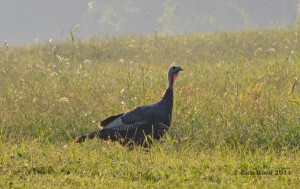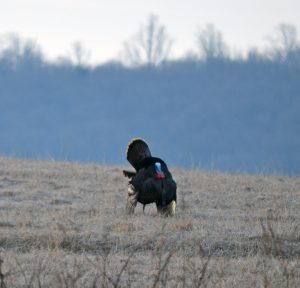Thanksgiving. That special day each year when we gather and remind each other of all the wonderful things we have to be thankful for, and……. we eat. For most Americans the meal centers on that wonderful fowl, turkey. Some choose the traditional technique of roasting (stuffed or not stuffed), others may braise it, grill it, deep fry it, broil it or barbeque it. Whatever method is preferred, one thing is almost always guaranteed-leftovers. Even after the grand feast is over, the delectable surplus of turkey lingers on! Yep, the appetizing opportunities of turkey leftovers are endless. Turkey sandwiches, both hot and cold, turkey pot pie, turkey soup, turkey casserole, and another dozen ways to finish off the delicious bird.
When it comes to eating Thanksgiving turkey, I confess, I’m also a picker and a hoarder and tend to lose some of my common sense. As quoted from one of my all-time favorite holiday movies, A Christmas Story (1983), “Now it is well known throughout the Midwest that the old man is a turkey junkie. A bona fide Gally Turkicanus freak. A few days before Christmas his eyes would begin to gleam with a wild and ravenous light.” On more than one occasion when no one is looking, I’ve burned my fingers peeling a small piece of crispy skin from the bird while still in the oven. I’m pretty sure this is why I no longer have any distinguishable fingerprints on my thumb and pointer finger. When the family is done with our wonderful meal and the great cleanup begins, I secretly grab a chunk of leftover breast meat, or a large, plump leg that everyone bypassed at the table and stuff it into a plastic container (or simply some aluminum foil) to hide in the back of the refrigerator-a food caching-technique I learned from my brother Eric!. My experience in top-secret stockpiling of turkey has taught me that most people exploring the refrigerator for leftovers will avoid what they can’t identify right away! I’ve even been accused of disguising leftover turkey as something else so no one else will touch it. I cannot comment on these accusations.
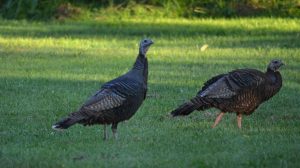 I love this bird! I love seeing a flock of Wild turkeys scratching the forest floor in search of beech nuts and acorns on a crisp October afternoon. I love hearing the loud, rich gobble of an old tom echo from a hillside, as he announces his territory on an early May morning, and I enjoy watching a seasoned hen lead her chicks into meadow in late July, combing every goldenrod for grasshoppers and crickets. Oh, and did I mention I love to eat turkey? White meat, dark meat, legs and thighs. Stick it between two pieces of white bread, splash on some mayo and top with a slice of tomato…wow! It’s all good. When it comes to dining on turkey, I’m easy to please!
I love this bird! I love seeing a flock of Wild turkeys scratching the forest floor in search of beech nuts and acorns on a crisp October afternoon. I love hearing the loud, rich gobble of an old tom echo from a hillside, as he announces his territory on an early May morning, and I enjoy watching a seasoned hen lead her chicks into meadow in late July, combing every goldenrod for grasshoppers and crickets. Oh, and did I mention I love to eat turkey? White meat, dark meat, legs and thighs. Stick it between two pieces of white bread, splash on some mayo and top with a slice of tomato…wow! It’s all good. When it comes to dining on turkey, I’m easy to please!
Wild turkeys are much different than their domestic relatives. One main distinction is that, well, they’re wild! Not being captive and not having food provided by humans every day, makes Wild turkeys extremely wary, adaptable and pretty darn smart. A Wild turkey’s home range covers several miles, and a variety of habitats. Each night they’ll roost high in a big oak or pine tree and can escape danger in the blink of an eye. While hunting these birds, I’ve seen them run at speeds that would impress an Olympic sprinter, then take-off like a jet leaving an aircraft carrier, and glide a ½ mile across a valley out of sight, in just a few seconds. In addition, a flock of 30 birds can move through the underbrush as quiet as a mouse in their dark. Their mottled color is perfect camouflage while traveling through the forests and fields they inhabit. Not too shabby for the bird that Ben Franklin wanted to make our national symbol !
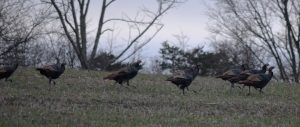 Proof of a Wild turkey’s craftiness was demonstrated to me one May morning during a spring gobbler hunting trip with Pa. It was 1978 and I had just turned 14 years old. Our destination was Fork Mountain in Wayne County, where Pa was born and raised. We woke up before dawn, ate a hearty breakfast and headed out to a favorite hillside where we knew turkeys might be roosting the night before. There was no trace of sunlight as we walked into the cold, dark woods and sat down next to a few large maples. The only sound came from a single Barred owl calling from a grove of Hemlocks just below us. The stillness of the forest and excitement of just being out there was almost more than I could take! After sitting silently for about 30 minutes, Chickadees and Titmice began singing around us as the eastern sky began showing a soft, orange hue. The last thing I remember at the time was thinking that I just wanted to close my eyes and rest for a minute, before it got light. After what seemed like just a few minutes, we were both suddenly awakened by the sound of leaves rustling and an explosion of “gobbling calls” only 20 feet away! I couldn’t believe it. Pa and I had both dozed off as a huge gobbler had quietly walked in behind us. I quickly turned to grab my gun, which had slid down into the leaves in front of me while I was napping, then banged my elbow on a tree I was half resting against. The big male turkey looked almost as surprised as I did, when it saw this “unfamiliar blob” tumbling around at the base of the large tree. Like a loud helicopter taking off from a pad, it flapped its large wings and burst through the canopy of the trees before I could manage to sit back up. It was halfway to NY by the time I thoroughly comprehended what had happened. I turned and looked at Pa, who was still rubbing his eyes a bit, when I asked, “Did we fall asleep?” With a smirk on his face, Pa replied, “You did, but I was just resting my eyes.”
Proof of a Wild turkey’s craftiness was demonstrated to me one May morning during a spring gobbler hunting trip with Pa. It was 1978 and I had just turned 14 years old. Our destination was Fork Mountain in Wayne County, where Pa was born and raised. We woke up before dawn, ate a hearty breakfast and headed out to a favorite hillside where we knew turkeys might be roosting the night before. There was no trace of sunlight as we walked into the cold, dark woods and sat down next to a few large maples. The only sound came from a single Barred owl calling from a grove of Hemlocks just below us. The stillness of the forest and excitement of just being out there was almost more than I could take! After sitting silently for about 30 minutes, Chickadees and Titmice began singing around us as the eastern sky began showing a soft, orange hue. The last thing I remember at the time was thinking that I just wanted to close my eyes and rest for a minute, before it got light. After what seemed like just a few minutes, we were both suddenly awakened by the sound of leaves rustling and an explosion of “gobbling calls” only 20 feet away! I couldn’t believe it. Pa and I had both dozed off as a huge gobbler had quietly walked in behind us. I quickly turned to grab my gun, which had slid down into the leaves in front of me while I was napping, then banged my elbow on a tree I was half resting against. The big male turkey looked almost as surprised as I did, when it saw this “unfamiliar blob” tumbling around at the base of the large tree. Like a loud helicopter taking off from a pad, it flapped its large wings and burst through the canopy of the trees before I could manage to sit back up. It was halfway to NY by the time I thoroughly comprehended what had happened. I turned and looked at Pa, who was still rubbing his eyes a bit, when I asked, “Did we fall asleep?” With a smirk on his face, Pa replied, “You did, but I was just resting my eyes.”
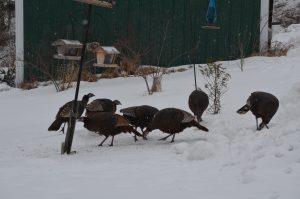
It’s generally believed that the “first Thanksgiving” occurred around 1621 in Plymouth, what is now Massachusetts. The Pilgrims and Puritans that emigrated from England brought over their tradition of “being thankful” for a bountiful harvest by celebrating with a large feast. But that “bountiful harvest” was primarily due to help they received from the Native Americans that lived in the area. They taught their new neighbors how to grow corn and squash, as well as how to effectively fish the local waterways and hunt the vast woodlands, which included Wild turkeys. They accomplished this without the use of camouflaged clothing, high tech calls, blinds, decoys and other gadgets to simply make a Wild turkey surrender. Oh, and they used primitive weapons-no auto-loading shotguns or rifles with expensive scopes.
I wonder if an occasional Native American, or Pilgrim, burned their hand trying to covertly steal an early piece of meat as it cooked over the open fire. Do you think the “first Thanksgiving” had leftovers? If so, I bet a few of them hoarded a few extra pieces away in an unmarked pouch somewhere. Ahhh-the tantalizing temptation of turkey, for almost 400 years! Let’s All Give Thanks!
